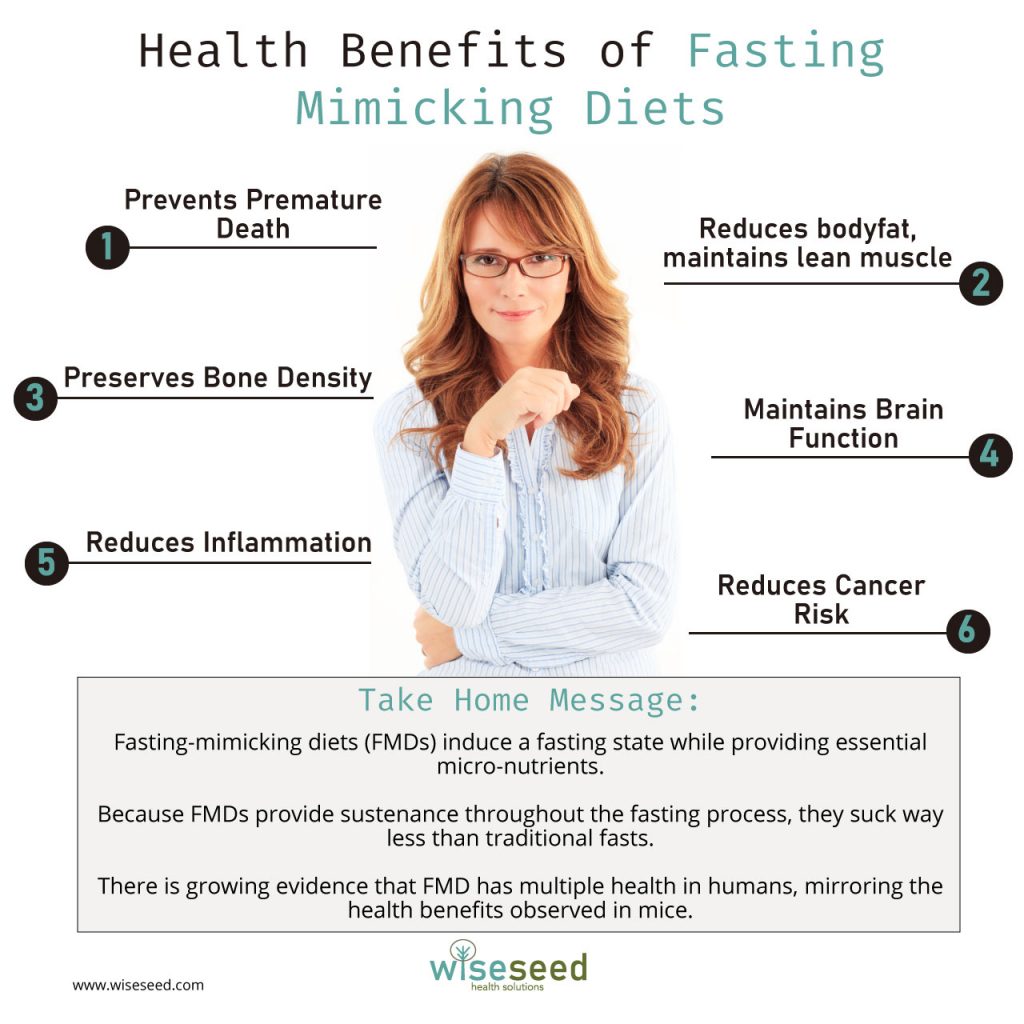Want to become anti-frail? Then consider a Fasting-Mimicking Diet.

Calorie Restriction Extends Lifespan
Suppose you are serious about extending your lifespan and staying healthy throughout old age? In that case, you’ll want to include some form of calorie restriction within your lifestyle!
Why? Because calorie restriction is a proven method for extending lifespan and reducing disease.
The Power of Calorie Restriction to Extend Life
We’ve known about the life-extending power of calorie restriction for a long time. For example, during World War One, people in Copenhagen had their diet restricted to bran bread, barley porridge, potatoes, greens, milk, and a small amount of butter (1). During this period of food shortage and calorie restriction, mortality decreased by thirty-four percent! A similar story played out in Norway during World War Two, where severe food restrictions dramatically reduced the number of cardiovascular deaths from 1940-1945 (2).
We now know that calorie restriction (without malnutrition) significantly extends the lifespan of worms, flies, mice, and primates (3). Now, the critical question is how to best implement calorie restriction in humans.
Enter Fasting-Mimicking diets (FMDs)
My preferred calorie restriction method is water-only fasting because it’s simple and effective. Sadly, however, water-only fasts are highly unpleasant. Furthermore, water-only fasts increase the risk of malnutrition in the elderly and people suffering chronic diseases, such as cancer patients.
Fortunately, a relatively new approach to fasting reduces the risk (and the awfulness) of traditional approaches to fasting: fasting-mimicking diets (FMDs).
What is an FMD? A fasting-mimicking is a plant-based diet that reduces your caloric intake and induces a fasted state (3). During FMDs, you consume low amounts of protein and sugars with (relatively) high amounts of unsaturated fats (3).
The beneficial properties FMDs are that they (i) mimic the metabolic and health effects of traditional fasting, (ii) significantly reduce the risk of malnutrition, and (iii) reduce the feelings of extreme hunger typically experienced during traditional fasting (3).
The Health Effects of the FMD in mice
Do FMDs work?
Well, FMDs certainly have a raft of positive effects on mouse health!
1. Improved Healthspan
Although mice on a fasting-mimicking diet didn’t live longer than usual, they had a much-reduced chance of dying young than mice on a standard diet (4). Furthermore, the FMD kept mice in good health throughout old age (4).
2. Bodyfat and Muscle Mass
Mice on the FMD experience lower body fat percentage while retaining their lean muscle mass (4). Thus, FMDs appear to be an effective method of losing fat while retaining muscle.
3. Bone Density
Mice on an FMD diet preserved their bone density compared to mice on their regular diet. Thus, FMDs either attenuate age-dependent loss of bone density or induce bone regeneration (4).
4. Brain Function
Mice on the FMD enjoyed improved learning and better short- and long-term memory function than mice on the standard diet (4). In addition, the FMD increased the generation of new neurons in the mouse brain compared to untreated controls (4).
5. Inflammation
Mice on the FMD are less likely to suffer from inflammatory skin conditions (4), which reveals that FMDs reduce chronic inflammation.
6. Cancer
Mice on an FMD experienced fewer tumors and had a lower chance of dying from cancer than mice on their standard diet (4). Thus, FMDs reduce cancer in mice.
Effects of the fasting FMD in humans
Because people aren’t mice, it’s essential to determine whether fasting-mimicking diets have similarly beneficial health effects in humans. Fortunately for us, it appears that they do.
People who undertook three cycles of FMD (five days of FMD at the end of each month for three months) enjoyed both reduced body fat and decreased blood pressure (5). Strikingly, participants on the FMD also experienced a significant decrease in insulin-like growth factor 1 (IGF-1) (5). Because high levels of IGF-1 incur an elevated risk of cancer, FMDs likely reduce cancer risk in humans (5).
Collectively, there is growing evidence that FMD has multiple health in humans, mirroring the health benefits observed in mice (3). Thus, FMDs provide a safe approach for you to enjoy the many health benefits of calorie restriction.
Take-Home Message
Fasting-mimicking diets offer several advantages over traditional approaches to fasting.
First, FMDs induce a fasting state while providing essential micro-nutrients, significantly reducing the risk of malnutrition.
Secondly, because FMDs provide sustenance throughout the fasting process, they suck way less than traditional fasts. In addition, you are less likely to break your fast by binging on junk food (been there, not a pretty sight).
Finally, more extended fasting periods may be required to gain the full health benefits fasting offers (5). Fortunately, FMDs provide a (relatively) enjoyable approach for you to fast for 4-5 days without the risk of malnutrition inherent to traditional fasting.
In the following articles, I’ll explore how FDAs are used to treat arthritis, cancer, and depression.

References and Further Reading
1. M. Hindhede, The effect of food restriction during war on mortality in Copenhagen. Journal of the American Medical Association 74, 381-382 (1920).
2. A. Strøm, R. A. Jensen, Mortality from circulatory diseases in Norway 1940-1945. The Lancet 257, 126-129 (1951).
3. G. Salvadori, M. G. Mirisola, V. D. Longo, Intermittent and Periodic Fasting, Hormones, and Cancer Prevention. Cancers 13, 4587 (2021).
4. S. Brandhorst et al., A Periodic Diet that Mimics Fasting Promotes Multi-System Regeneration, Enhanced Cognitive Performance, and Healthspan. Cell Metab 22, 86-99 (2015).
5. M. Wei et al., Fasting-mimicking diet and markers/risk factors for aging, diabetes, cancer, and cardiovascular disease. Sci Transl Med 9, (2017).
Acknowledgements
Images created by Szepy and peredniankina
Disclaimer
The material displayed on this website is provided without any guarantees, conditions or warranties as to its accuracy.
Information written and expressed on this website is for education purposes and interest only. It is not intended to replace advice from your medical or healthcare professional.
You are encouraged to make your own health care choices based on your own research and in conjunction with your qualified practitioner.
The information provided on this website is not intended to provide a diagnosis, treatment or cure for any diseases. You should seek medical attention before undertaking any diet, exercise, other health program or other procedure described on this website.
To the fullest extent permitted by law we hereby expressly exclude all warranties and other terms which might otherwise be implied by statute, common law or the law of equity and must not be liable for any damages whatsoever, including but without limitation to any direct, indirect, special, consequential, punitive or incidental damages, or damages for loss of use, profits, data or other intangibles, damage to goodwill or reputation, injury or death, or the cost of procurement of substitute goods and services, arising out of or related to the use, inability to use, performance or failures of this website or any linked sites and any materials or information posted on those sites, irrespective of whether such damages were foreseeable or arise in contract, tort, equity, restitution, by statute, at common law or otherwise.

Ten Minutes is All You Need
Research has shown that ten minutes of moderate-to-vigorous exercise performed each day is enough to significantly reduce your risk of early death.

Overcoming Adversity and Rapid Change
The SPAR methodology provides a simple framework that helps you overcome adversity, adapt to rapid change and achieve your life goals.




